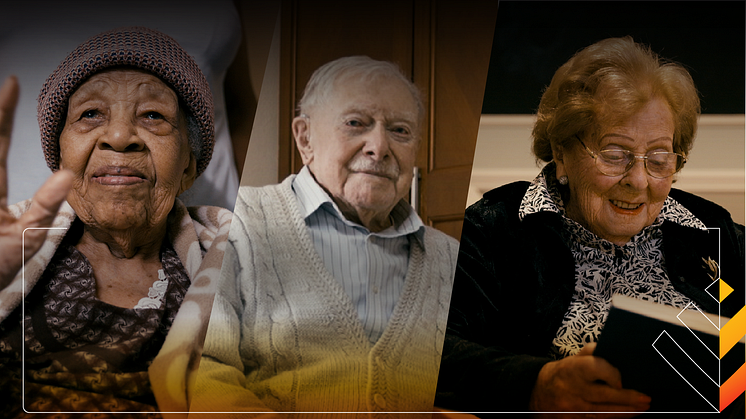
Press release -
Living to 100 and beyond: Celebrating the Discovery Health Medical Scheme’s 90 centenarian members
- In April 2023, Discovery Health Medical Scheme (DHMS) provided cover to 90 centenarian members (people aged 100 years or older), including two semi-supercentenarians aged 105.
- These members represent 0.0032% of DHMS lives (32 centenarians per million Scheme members).
- Ironically, DHMS centenarians are healthier than the average elderly member, with a chronic condition prevalence that is similar to Scheme members aged between 60 and 64.
- Overall, DHMS centenarians experience a very low incidence of chronic conditions, cancers, and other diseases. They also rarely need admission to hospital.
- 78% of DHMS centenarians have received a COVID-19 vaccination.
Johannesburg, 06 December 2023 – Discovery Health’s Research Intelligence team has released the findings of an inspiring study into Discovery Health Medical Scheme’s 90 centenarians (people aged 100 years old and older).
“This remarkable group of 90 individuals stand out among the 2.7 million members of DHMS,” says Discovery Health’s Chief Research Actuary, Shirley Collie. “Our study – which runs to the end of April 2023 – reveals a range of dynamics that challenge stereotypes around ageing and inspire a positive narrative around the potential for living a fulfilling life, well into the triple digits.”
At 105 years old, two of the DHMS centenarian members are semi-supercentenarians.
There has been a steady increase in the number and proportion of Scheme members reaching and exceeding the age of 100 over the past 15 years, congruent with the global trend of people living longer:
- 2008 – 9 members or 0.0005% of the member base, representing almost 5 centenarians per million members
- 2018 – 54 members, 0.0019%, representing almost 20 centenarians per million members
- 2023 – 90 members, 0.0032%, representing 32 centenarians per million members.
“Over the past century we have seen improvements in life expectancy, on a global scale,” explains CEO of Discovery Health, Dr Ryan Noach. According to the World Health Organization, by 2050, the world’s population of people aged 60 years and older will double to 2.1 billion people. At present, there are around 600 000 centenarians across the world (in a global population of around 8 billion.
“Unfortunately, there has not been a concomitant increase in people spending a higher proportion of those extra years of life in good health,” says Noach. “For example, a recent McKinsey Health Institute paper, shares that while global life expectancy has more than doubled (from 30 to 73 years) from 1800 to 2017, the amount of time that people spend living in poor health has stayed constant at around 50% of their lives. The rising tide in the prevalence of chronic conditions across the world may worsen this situation in time.”
“With this in mind, it is incredible to observe how healthy the 90 DHMS centenarian members are. We are very proud to look after their healthcare and to reflect on the potential for healthy ageing that they embody.”
Centenarians experience chronic conditions at a rate on par with younger Scheme members
Among the 90 centenarian DHMS members, 78 are female. Whilst this demonstrates clearly that females tend to outlive males, it is important to note that the 12 males in the group are healthier than the females, experiencing fewer chronic illnesses on average, and fewer types of disease too.
In respect of chronic illnesses among the majority of members (data from 1 May 2022 to 30 April 2023):
- 9 had no chronic illness
- 27 had 1 chronic illness
- 24 had two chronic illness
- 8 members had three chronic illnesses
- 14 members had 4 chronic illnesses.
Noach adds, “Its remarkable that these members’ data are aligned to that of much younger medical scheme members. The average number of chronic conditions in the centenarian group is 2.44 which is on par with the average number of chronic conditions (2.45) seen in members aged 60 to 64 years old.”
- What sort of chronic illnesses affect centenarian members, and are males and females affected differently?
The four most prevalent conditions among the 90 DHMS centenarians were hypertension (61 members), followed by hyperlipidemia (24), congestive heart failure (16) and hypothyroidism (16).
These conditions are prevalent in females and males as follows:
- Hypertension - 60% of females and 57% of males, the most common condition in both sexes.
- Hyperlipidemia - 29% of males and 22% of females, the second-most common condition in both sexes.
- Chronic ischaemic heart disease - 15% of females and 14% of males.
- Atrial fibrillation and atrial flutter – 15% of females and 7% of males.
- Glaucoma – 7% of males and 7% of females.
These conditions only affect female members: Congestive heart failure (18%), hypothyroidism (18%), osteoporosis (7%), cardiac arrythmias (4%), type 2 diabetes (3%).
“The finding that females make up the majority of the DHMS centenarian cohort, but that the male members in the group are healthier than the females, is not unprecedented,” says Collie. “Studies into the so-called ‘gender gap in life expectancy’ identify that a range of factors - from biological to cultural, behavioural, and genetic differences - may account for these trends.”
How frequently are DHMS centenarian members admitted?
Just over one quarter (22) of the 90 DHMS centenarian members went to hospital between 1 May 2022 and 30 April 2023. The majority of admissions (5 of 22) were for cellulitis, a relatively common bacterial skin infection that is easily treated. Three centenarians needed surgery, including cardiac and joint procedures. Also, one centenarian was admitted twice for cardiac valve-related procedures.
Very low incidence of cancer among DHMS centenarian members
According to the US Government's National Cancer Institute around 39.5% of males and females will be diagnosed with cancer during their lifetimes (based on 2015-2017 data).
“Defying relative population-based odds, only 4 of the 90 centenarians were found to have been diagnosed with cancer. These were diagnosed between 4 and 16 years ago – so all four are cancer survivors,” says Collie.
How did DHMS’ centenarian members fare through the COVID-19 pandemic?
During the COVID-19 pandemic, 4 centenarian members (4.4% of the group) were admitted to hospital to treat severe COVID-19 disease. This admission rate is the same as for younger Scheme members – those aged 60 to 64 years old.
All four of the centenarians admitted, survived. Additionally, 78% of this group have been vaccinated for COVID-19, most with two or three vaccines.
“Centenarians are without question at high-risk for serious COVID-19 related illness. Whether related to the protective effects of vaccination or to their overall robust physical state, they certainly defied the odds on this front too,” adds Noach.
What do the centenarians have to say about living a long and healthy life?
“It was an absolute privilege for us to sit with and interview three of our inspiring centenarian medical scheme members – Ida Harman, Albert Denman and Noni Makhetha – and to capture some of their life experience and wisdom,” adds Noach.
- Albert Denman is 103 years old. The former aircraft engineer who only retired at 88 years old, builds flying model aeroplanes. “It’s a great hobby. It’s constructive and technical with quite a bit of woodwork,” he says.
- Ida Harman is 101. She loves reading so much that she set up and ran a library for residents at a retirement lodge where she lived. “I ran it for a couple of years. It was lovely,” she says.
- And, 100-year-old Noni Makhetha, has lived a life that’s kept her physically active and financially savvy – ways of life she’s passed on to her family, who view her as their matriarch.
- Watch our inspiring video interviews with each of these centenarians:
Noach concludes, “This analysis gives us all a chance to reflect on the fact that living a long and healthy life comes down to the sum of the habits we practice each day - along with a bit of help from good genetics. Reaching 100 years of age and over is indeed cause for celebration, not only for the individual but for their community and society at large. Our research adds to global evidence around centenarians and the positive influence that these people have on changing societal perceptions of ageing.”
Notes to editor
Read the full analysis of the DHMS Centenarians on the Discovery Health Insights Hub
About Discovery Health's Health Intelligence Team
Discovery Health's dedicated Health Intelligence Team consists of actuaries, actuarial analysts, data scientists, data analysts, doctors, and computer programmers who interpret a wide range of dynamics related to the 18 medical schemes administered by Discovery Health.’ Their insights are regularly published on the Discovery Health Insights Hub.
More on the gender gap in life expectancy:
The differences in life expectancy between males and females result from a complex interplay of biological, social and health service factors. One study suggests a strong contributing factor may be the higher incidence of heart disease-related morbidity and mortality in males. Another studysuggests that the female survival advantage has a biological basis to the extent that even new-born females are better able to survive extreme mortality hazards than males. Studies also suggest that females outlive males for reasons related to the protective actions of oestrogen.
The New England Centenary Study (NECS, by Boston University's Chobanian and Avedisian School of Medicine) is a longitudinal, population-based study of US-based centenarians. Started in 1995 it is said to be the largest and most comprehensive study of centenarians and their families in the world. This study has investigated the genetic profiles linked to old age and determined the 27 genetic signatures that are common to 91% of the 801 centenarians in the NECS study, conferring protection from age-related diseases. This study also finds that exceptional longevity runs strongly in families. Statistics collated through the NECS indicate that across the world 85% of centenarians are female but that the males who become centenarians are generally functionally better off and healthier than the females.
Topics
Categories
Discovery information
About Discovery
Discovery Limited is a South African-founded financial services organisation that operates in the healthcare, life assurance, short-term insurance, banking, savings and investment and wellness markets. Since inception in 1992, Discovery has been guided by a clear core purpose – to make people healthier and to enhance and protect their lives. This has manifested in its globally recognised Vitality Shared-Value insurance model, active in over 40 markets impacting over 40 million lives. The model is exported and scaled through the Global Vitality Network, an alliance of some of the largest insurers across key markets including AIA (Asia), Ping An (China), Generali (Europe), Sumitomo (Japan), John Hancock (US), Manulife (Canada) and Vitality Life & Health (UK, wholly owned). Discovery trades on the Johannesburg Securities Exchange as DSY.
Follow us on Twitter @Discovery_SA



